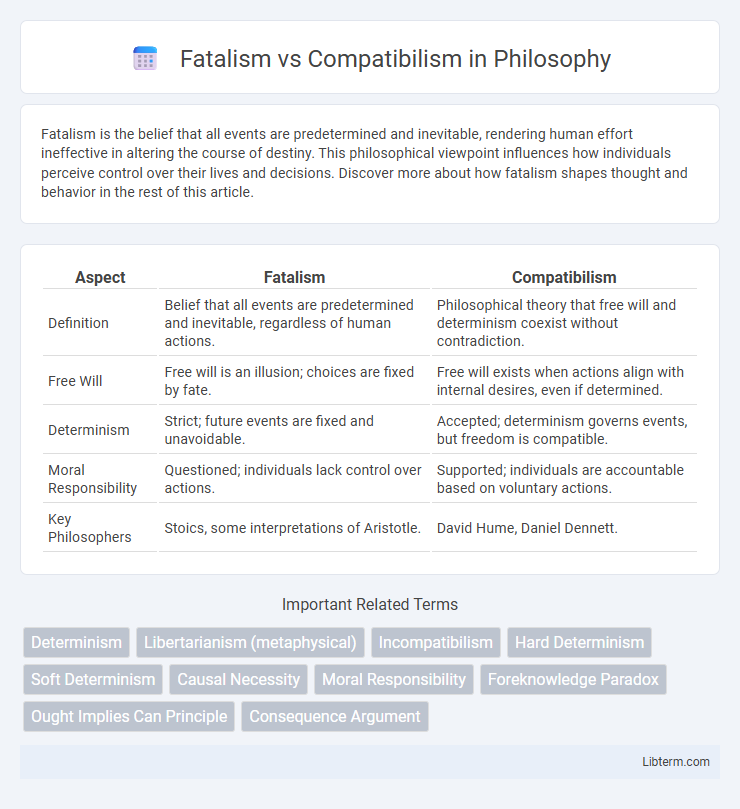Fatalism is the belief that all events are predetermined and inevitable, rendering human effort ineffective in altering the course of destiny. This philosophical viewpoint influences how individuals perceive control over their lives and decisions. Discover more about how fatalism shapes thought and behavior in the rest of this article.
Table of Comparison
| Aspect | Fatalism | Compatibilism |
|---|---|---|
| Definition | Belief that all events are predetermined and inevitable, regardless of human actions. | Philosophical theory that free will and determinism coexist without contradiction. |
| Free Will | Free will is an illusion; choices are fixed by fate. | Free will exists when actions align with internal desires, even if determined. |
| Determinism | Strict; future events are fixed and unavoidable. | Accepted; determinism governs events, but freedom is compatible. |
| Moral Responsibility | Questioned; individuals lack control over actions. | Supported; individuals are accountable based on voluntary actions. |
| Key Philosophers | Stoics, some interpretations of Aristotle. | David Hume, Daniel Dennett. |
Understanding Fatalism: Defined and Explained
Fatalism is the philosophical doctrine asserting that all events are predetermined and inevitable, rendering human free will ineffective. It posits that outcomes occur independently of individual actions, emphasizing a fixed future where choices cannot alter destiny. This concept contrasts sharply with compatibilism, which reconciles free will and determinism by suggesting that freedom exists within predetermined boundaries.
Defining Compatibilism: Bridging Free Will and Determinism
Compatibilism defines free will as the capacity to act according to one's motivations without external coercion, even within a deterministic framework where all events are causally determined. This philosophy reconciles moral responsibility with determinism by asserting that freedom is compatible with causal laws if individuals can act in alignment with their desires and rational deliberations. By bridging free will and determinism, compatibilism challenges fatalism's notion of inevitable outcomes, emphasizing meaningful human agency within predetermined conditions.
Key Differences Between Fatalism and Compatibilism
Fatalism asserts that all events are predetermined and inevitable, rendering human free will an illusion, while Compatibilism maintains that free will and determinism coexist, allowing individuals to make meaningful choices within causal constraints. Fatalism emphasizes the inevitability of outcomes regardless of actions, whereas Compatibilism highlights the compatibility of moral responsibility with determinism. The key difference lies in whether free will is denied outright (Fatalism) or redefined to coexist with causal determinism (Compatibilism).
Historical Perspectives: Philosophers on Fatalism and Compatibilism
Ancient philosophers such as the Stoics championed fatalism, asserting that a divine reason governs all events, making human freedom an illusion. In contrast, medieval thinkers like Thomas Aquinas reconciled divine omniscience with human free will, laying early foundations for compatibilism. Enlightenment philosophers, including David Hume and Immanuel Kant, further developed compatibilist ideas by arguing that freedom consists in acting according to one's determined desires and reason, despite causal determinism.
The Role of Causality in Both Doctrines
Fatalism asserts that all events are predetermined and inevitable, emphasizing an unbreakable chain of causality that leads to fixed outcomes regardless of human actions. Compatibilism, while acknowledging causal determinism, argues that free will and moral responsibility coexist with causal laws because human decisions arise from internal desires and motivations within this causal framework. The role of causality in fatalism negates genuine choice by enforcing inevitability, while in compatibilism, causality underpins a structured freedom aligned with determinism.
Human Agency: Illusion or Reality?
Fatalism asserts that all events are predetermined and inevitable, often challenging the notion of genuine human agency. Compatibilism reconciles free will with determinism by arguing that human agency is real when actions align with internal motivations, even if causally determined. This philosophical stance emphasizes that the experience of choice reflects authentic decision-making within a deterministic framework.
Moral Responsibility Under Fatalism and Compatibilism
Moral responsibility under fatalism is often challenged due to the belief that all events, including human actions, are predetermined and immutable, which may negate genuine control over one's decisions. Compatibilism reconciles determinism with moral responsibility by asserting that individuals can be held accountable if their actions align with internal motivations and desires, even if those desires are causally determined. Philosophers like Daniel Dennett argue that under compatibilism, moral responsibility remains meaningful because it depends on the capacity to reflect and respond to reasons, not on absolute freedom from causation.
Common Misconceptions: Fatalism vs. Determinism
Fatalism is often mistaken for determinism, but they differ fundamentally: fatalism asserts that outcomes are fixed regardless of actions, while determinism holds that every event is caused by preceding events in accordance with natural laws. A common misconception is that determinism implies inevitability of all events, yet it allows for causal chains influenced by human choices, unlike fatalism's predetermined, unavoidable fate. Understanding this distinction is crucial for accurate discussions in philosophy of free will and moral responsibility.
Compatibilism in Contemporary Philosophy
Compatibilism in contemporary philosophy asserts that free will and determinism are not mutually exclusive, emphasizing that individuals can be morally responsible even in a deterministic universe. This perspective redefines free will as the ability to act according to one's desires and intentions without external coercion, aligning closely with everyday notions of accountability. Major philosophers like Daniel Dennett and Harry Frankfurt have contributed significantly to the development of compatibilist theories, addressing challenges posed by strict fatalism and emphasizing nuanced understandings of human freedom.
Practical Implications: Living with Fatalism or Compatibilism
Living with fatalism often leads to acceptance of predetermined outcomes, potentially reducing motivation to change circumstances or pursue goals. In contrast, adopting compatibilism fosters a balance between acknowledging determinism and exercising personal agency, encouraging proactive decision-making and moral responsibility. Practical implications include enhanced well-being and resilience when individuals perceive control over their actions within deterministic frameworks.
Fatalism Infographic

 libterm.com
libterm.com